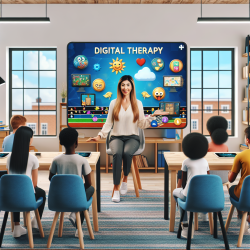As school social workers, your mission to nurture the holistic well-being of students is more vital today than ever. In a world where technology has reshaped the contours of education, it's natural to be curious about how it can be harnessed to support the social and emotional fabric of our schools. With an increasing number of educational services transitioning to the digital realm, it's time to turn our attention to the promising horizon of online speech therapy and telepractice.
Imagine a scenario where geographical boundaries dissolve, and the best therapeutic resources are available at the click of a button. This is not a futuristic dream but a present reality. Online speech therapy, a key component of telepractice, is an innovative solution that allows school social workers like you to extend your reach, ensuring that every child receives the attention and care they deserve.
The Integration of Technology in Therapy
Integrating technology into therapy isn't just about staying current with trends; it's about enhancing the support systems we have in place for our students. Telepractice, the delivery of therapy services via telecommunications technology, is a field that has seen remarkable growth and success in recent years. It encompasses a range of services, including speech-language therapy, which is critical for students with communication challenges.
Online speech therapy brings the specialist to the student, regardless of where they are. This approach is not only innovative but also necessary in a world where school resources are often stretched thin. For school social workers, embracing telepractice means breaking down barriers to access and fostering a more inclusive environment for all students.
The Benefits of Online Speech Therapy
Why should we, as school social workers, advocate for online speech therapy? The benefits are manifold. Firstly, it offers flexibility. Students can engage with their therapists from anywhere, reducing the need for travel and making it easier to fit therapy into busy school schedules. Secondly, it provides access to specialized therapists who may not be available locally, ensuring that students receive the highest quality of care.
Moreover, online therapy can be highly engaging for students. Digital natives, our students are comfortable with screens and often find the interactive nature of online therapy to be motivating and fun. The use of virtual tools and games can make learning more dynamic, leading to improved outcomes.
Parent-Friendly Technology
For parents, the idea of telepractice might be new, and naturally, they might have concerns about its effectiveness. However, the technology used in online speech therapy is designed to be parent-friendly. Platforms are secure, user-friendly, and require minimal technical know-how. Parents can easily become involved in their child's therapy sessions, which can take place in the comfort of their own home. This level of involvement not only empowers parents but also reinforces the learning process, creating a supportive triad between the student, therapist, and family.
Building a Collaborative Network
Telepractice doesn't mean working in isolation. On the contrary, it fosters a collaborative network where school social workers, therapists, teachers, and parents can work together seamlessly. With online platforms, sharing progress, setting goals, and developing strategies becomes more efficient, ensuring that everyone is on the same page when it comes to supporting the student's development.
As social workers, you are often the bridge between various stakeholders in a child's education. Telepractice strengthens this bridge by providing a platform for ongoing communication and collaboration. This integrated approach is crucial for creating a supportive ecosystem around each student.
Overcoming Challenges and Embracing Change
Change is never without its challenges, and the shift towards online therapy services requires us to address several concerns. Ensuring digital equity is one such challenge; all students must have access to the necessary technology and a reliable internet connection. School social workers play a pivotal role in identifying these gaps and advocating for resources to bridge them.
Another challenge is ensuring the quality of therapy remains high. This involves selecting reputable online therapy services, like TinyEYE, which have a proven track record of success and employ qualified, experienced therapists. It's also essential to ensure that the services are compliant with the Health Insurance Portability and Accountability Act (HIPAA) and the Family Educational Rights and Privacy Act (FERPA) to protect student privacy.
Inspiring Action and Adoption
As we look to the future, the goal is to inspire schools and communities to adopt online speech therapy and telepractice more broadly. Sharing success stories, demonstrating the effectiveness of online therapy, and highlighting the positive impact on students' lives are powerful ways to build confidence in these services.
As school social workers, you are in a unique position to champion this cause. By embracing telepractice, you can help lead the way in modernizing support systems for students, ensuring they have the resources they need to thrive in today's digital world.
Let's be curious together, exploring the possibilities that technology brings to our profession. By staying informed, collaborating with experts, and advocating for our students, we can turn the potential of online speech therapy and telepractice into a reality that benefits everyone in the educational community.
It's time to look ahead with optimism and take bold steps towards a future where every child has the opportunity to communicate effectively and reach their full potential. Let's be inspired by the promise of telepractice and work together to make it an integral part of our schools' support systems.










